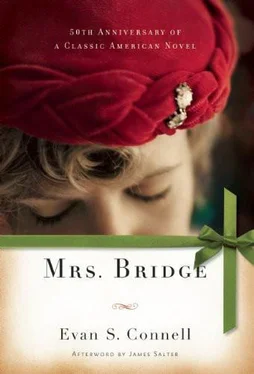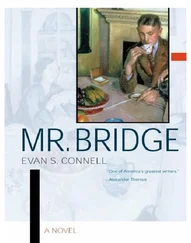The evenings were growing cooler, September was here, au-tumn not far to the north, and the trees rustled uneasily.
Having ordered the groceries and having spent the remainder of the morning more or less listening to the radio, and being then unable to find anything else to do, she informed Harriet who was In the kitchen furiously smoking one cigarette after another while cutting up dates for a pudding that she had some shopping to take care of on the Plaza and would not be home until late that afternoon. She felt somewhat guilty as she said this because in reality there was no shopping to be done, but, with the children again in school and with Harriet to do the cooking and housekeeping and with the laundress coming once a week to do the washing, Mrs. Bridge found the days were very long. She was restless and unhappy and would spend hours thinking wistfully of the past, of those years Just after her marriage when a day was all too brief.
After luncheon in her favorite tearoom she decided she might as well look at candlesticks. She had been thinking of getting some new ones; this seemed as good a time as any. On her way to Bancroft’s, which carried the nicest things on the Plaza, she stopped at a drugstore for a box of aspirin, then paused In front of a bookstore where her eye was caught by the title of a book in the window display: Theory of the Leisure Class. She experienced a surge of resentment. For a number of seconds she eyed this book with definite hostility, as though it were alive and conscious of her. She went inside and asked to see the book. With her gloves on it was difficult to turn the pages, so she handed it back to the clerk, thanked him, and with a dissatisfied expression continued to Bancroft’s.
If she bought a book it was almost always one of three things: a best-seller she had heard about or seen advertised, a self-improvement book, or a book by a Kansas City author no matter what it was about. These latter were infrequent, but now and again somebody would explode in the midst of Kansas City with a Civil War history or an account of old Westport Landing. Then, too, there were slender volumes of verse and essays usually printed by local publishing houses, and it was one of these that lay about the living room longer than any other book, with the exception of an extremely old two-volume set of The Brothers Karamazov in gold-painted leather which nobody in the family had ever read and which had belonged to Mr. Bridge’s grandfather. This set rested gravely on the mantelpiece between a pair of bronze Indian-chief heads the only gift from cousin Lulubelle Watts that Mrs. Bridge had ever been able to use and was dusted once a week by Harriet with a peacock-feather duster.
The volume that ran second to The Brothers Karamazov was a collection of thoughts by the local minister, Dr. Foster, an exceptionally short and congenial man with an enormous head which was always referred to as leonine, and which was crowned with golden white hair. He allowed his hair to grow very long and he brushed it toward the top of his head so as to appear taller. He had written these essays over a period of several years with the idea of putting them into book form, and from time to time he w r ould allude to them, laughingly, as his memoirs. Then people would exclaim that he surely mustn’t keep them to himself until he died, at which Dr. Foster, touching the speaker’s arm, and perhaps rising on tiptoe, would laugh heartily and reply, “We’ll see, well see,” and thereupon clear his throat.
At last, when he had been preaching in Kansas City for seventeen years and his name was recognized, and he was often mentioned in The Tattler and sometimes in the city paper, a small publishing firm took these essays, which he had quietly submitted to them several times before. The book came out in a black cover with a dignified gray and purple dust jacket that showed him gazing sedately from his study window at dusk, hands clasped behind his back and one foot slightly forward.
The first essay began: “I am now seated at my desk, the desk that has been a source of comfort and inspiration to me these many years. I see that night is falling, the shadows creeping gently across my small but (to my eyes) lovely garden, and at such times as this I often reflect on the state of Mankind.”
Mrs. Bridge read Dr. Foster’s book, which he had autographed for her, and she was amazed to find that he was such a reflective man, and so sensitive to the sunrise which she discovered he always got up to watch. She underlined several passages in the book that seemed to have particular meaning for her, and when It was done she was able to discuss it with her friends, all of whom were reading it.
This book came to her like an olive branch. It assured her of God’s love for man, of man’s love of God: in the ever-lengthening shadow of Hitler and Mussolini her faith was restored, and the comfortable meditations of her minister found lodging.
Quite a different sort of writer was Mabel Ong. There were persistent rumors that Mabel was a poet supposedly quite good and that one of her poems had been published in a magazine. Mrs. Bridge, having made discreet inquiries which failed to elicit either the name of the magazine or the title of the poem, was therefore pleased to hear Lois Montgomery announce that as a special treat immediately following the next Auxiliary meeting Mabel would read from her works. She was a vigorous, muscular woman of about thirty-five, with a sprinkling of moles on her forehead, and close-cropped hair, who generally wore a tweed coat and stood with her hands thrust into the pockets like a man. She had a positive manner of speaking, now and then turning her head aside to cough or to laugh; she spoke bitterly about capitalism and would relate stories she had heard from unquestionable sources about women dying in childbirth because they could not afford the high cost of hospitalization, or even the cost of insurance programs.
“If I should bear a child ” she was fond of beginning, and would then tear into medical fees.
On the appointed day Mabel Ong walked briskly to the front of the room, carrying a briefcase as though it were a book, and having placed this briefcase on a card table she unzipped it, spent several minutes shuffling through some papers, frowning, but eventually located whatever she was after. She poured herself a drink of ice water from the pitcher, lighted a cigarette, and with one eye closed against the smoke she shuffled through the papers again, Mrs. Bridge watched attentively, thinking that Mabel certainly looked capable of being a poet.
After another drink of water she crushed out her cigarette, ran her tongue over her teeth, and pensively frowned into space. All at once she began:
“Out of the wild womb weeping “
Mabel was just a bit tongue-tied and Mrs, Bridge, in the back row, was not certain whether she had said “weeping” or “leaping/ but decided not to inquire. When the reading concluded she applauded along with everyone else, and she stood around for a while and listened as various members of the Auxiliary asked Mabel about the significance of one line or another. Mrs, Bridge had not enjoyed the poems they sounded quite free and not very poetic and she hoped no one would ask for her opinion of them. No one did, though on a certain occasion she was rather surprised to hear herself volunteering the information that she had not cared for them; and being embarrassed by this critical observation, for she was conscious of her own limitations, she quickly added, “However, I’m sure I couldn’t do half as well/*
Читать дальше












